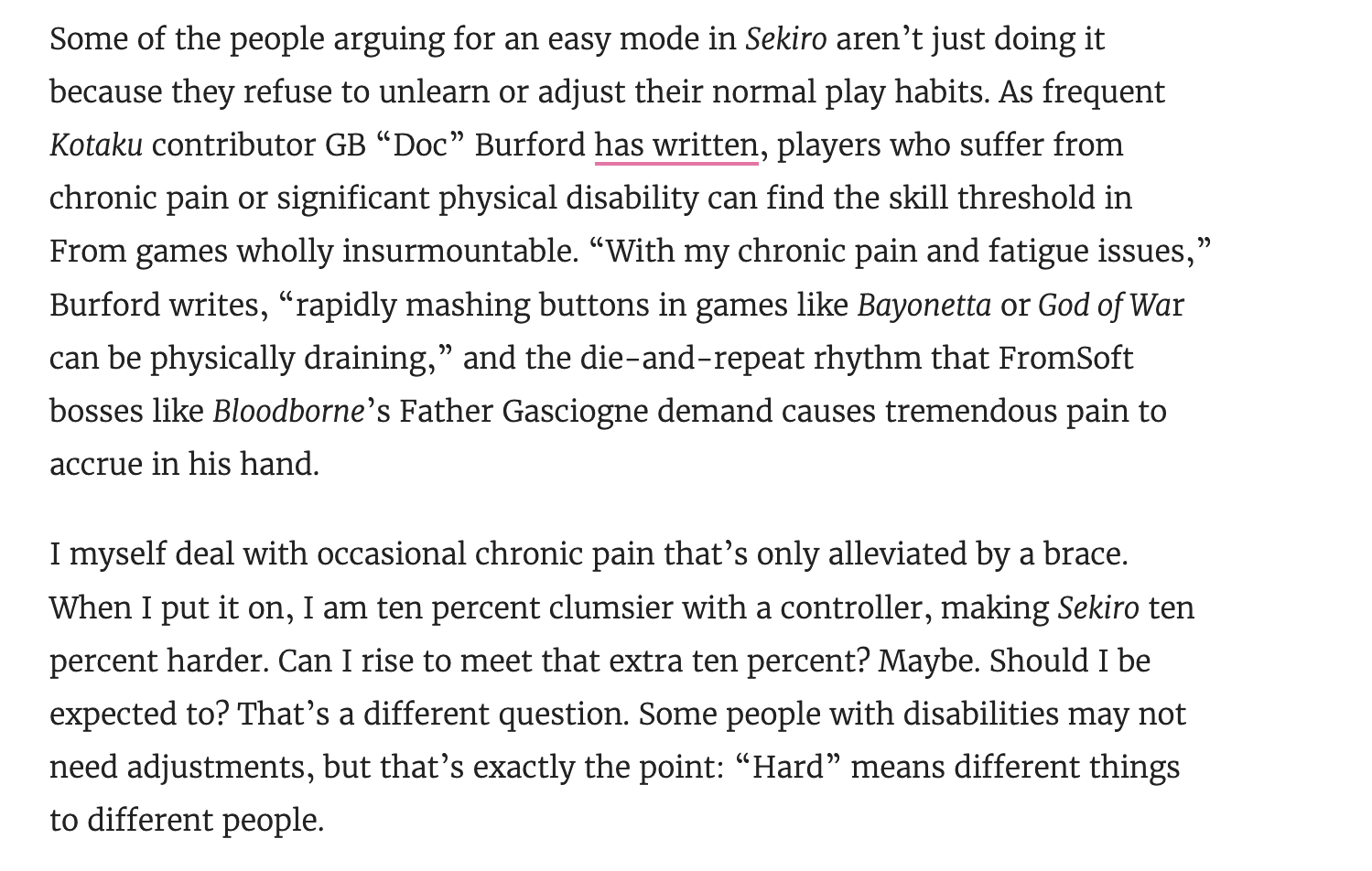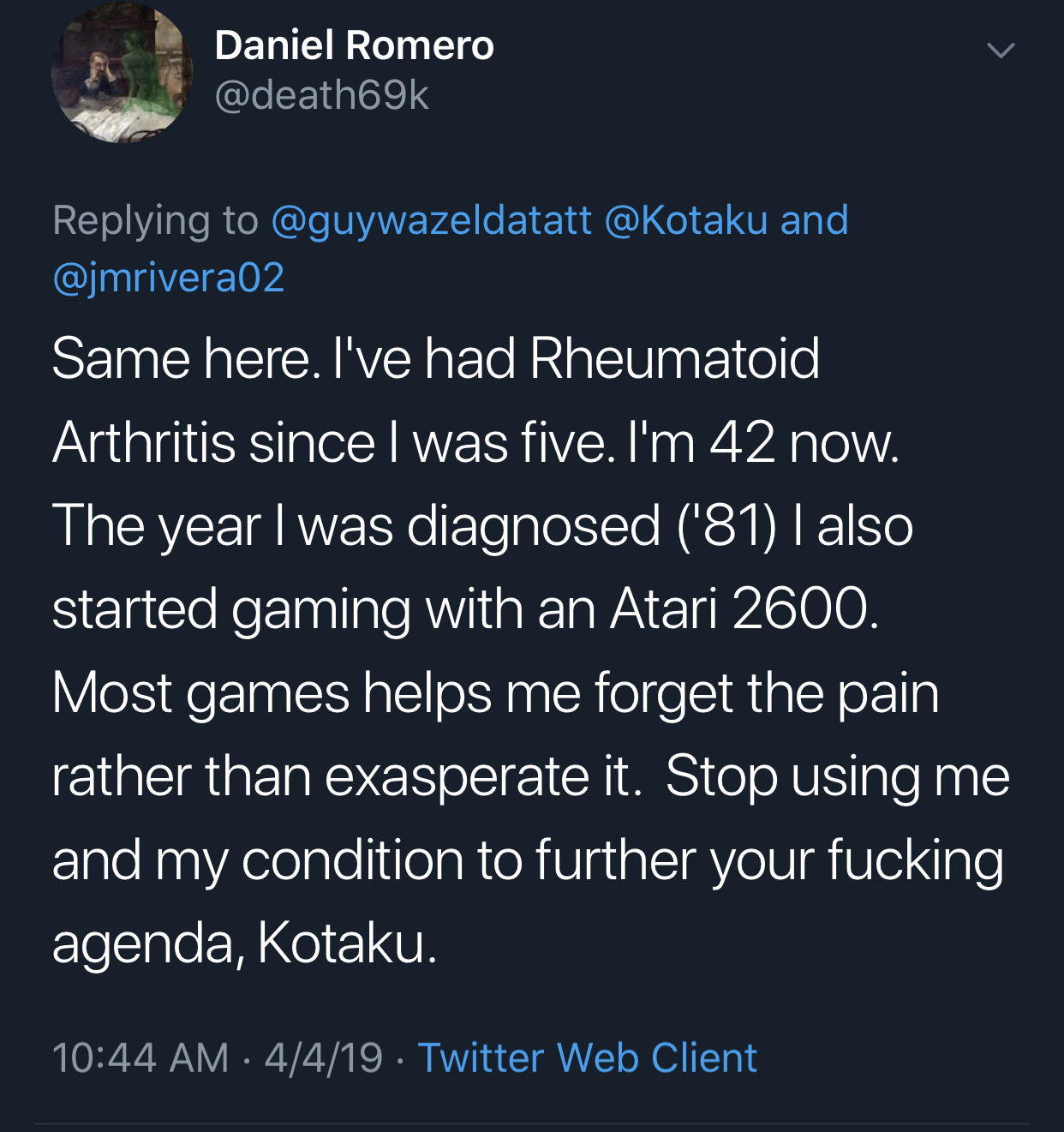Sekiro is the latest title from FromSoftware, published by Activision. It’s been mired in controversy as of late due to its daunting difficulty and the fact that it’s not “inclusive” enough. This outrage is coming from gaming journalists, who are abusing their platforms to push an agenda that all games should be accessible to everyone. While in principle this isn’t a bad idea, in practice it simply doesn’t work. All games have certain target demographics. FromSoftware’s games have always been known for their difficulty and Sekiro is no different. It’s a throwback to the titles of the 80s and the 90s. It doesn’t even have an online mode, which would typically alleviate some of the games’ difficulty. It’s very hard, but also incredibly rewarding, like games from the early 90s.

Some are not happy about this though. They feel a sense of entitlement, that FromSoftware should alter their vision in order to accommodate their needs, either due to their lack of skill or because they suffer from disabilities and chronic pain. They believe that all games are meant for everyone and need to be all-inclusive, which is a logical fallacy.
Different games are marketed to different demographics. There are games for those who want a more casual experience; there are games for those who want a more hardcore experience; there are games that are more story-driven, especially in the JRPG genre; there are games that are puzzle intensive, such as many Zelda games, that cater toward a specific way of thinking in order to progress; there are games based on anime which are meant for anime fans. Gaming has never been all-inclusive and never will be. It’s a fact of life, and it’s perfectly okay.
Exploiting the Disabled

This is an excerpt from an article from Kotaku, a reprehensible example of their staff using their platform to push their social agenda of “inclusivity.” I refuse to link to the article; you can find it yourself easily enough. There’s a major problem with this though. It exploits the disabled in order to push a narrative and uses their own contributors’ experiences (and the author of the article) to do so. This is beyond unethical. I’m not invalidating pain or disabilities, but as someone who is completely disabled myself, I find the fact that they are using disabled gamers as a shield in order to try to pressure FromSoftware into altering their vision disgraceful. The author of the article is Joshua Rivera. He quotes his fellow contributor Doc Burford.


This is what happens when you take identitarianism and identity politics to their logical conclusion; everybody must be accommodated and everything must be all-inclusive. People are categorized into infinite groups of who’s more marginalized and who’s more oppressed. Guess what? Life has no easy mode. Some games aren’t meant for you. I can’t play any Nintendo game with motion controls. I can’t play my favorite Zelda game anymore. I can’t play VR. I accept that, even though I love Nintendo and VR’s immersion. I simply recognize the games aren’t meant for me, and that’s okay. I don’t complain and I’m no victim.
When confronted with the unethical practices of the article and Kotaku, Doc had some choice words.

Using not only a colleague, but a large platform to advocate for a friend’s position is a clear abuse of power and is unethical. This should be no surprise though, as Kotaku has been doing this for years. These people are no victims, as much as they incessantly claim to be. They miss the point of what the game represents or simply don’t care. This is a pure example of everything that is wrong with mainstream gaming journalism and why the general public has so little respect for them.
The Guardian has a perfect explanation of the rationale of who they refer to as “progressives” (that’s not a term I would use, I would say identitarians) who feel that the lack of an easy mode for Sekiro is something that is inherently exclusionary.
“Some progressives believe that games should be accessible to allcomers, offering in-built concessions to those unable, for whatever reason, to progress. Difficulty, they argue, is a weapon used to exclude – an issue for an industry that has, in the past, harmfully cultivated an audience of near-fanatical young men. Others counter that the calibration of difficulty is, in essence, an artistic choice. To demand a designer “dumb down” their game is akin to asking for a monosyllabic edition of the works of Proust. You might gain readers in doing so, but at what cost?“
Gamers Are Not Entitled

Living with a disability and chronic pain is incredibly difficult, but that doesn’t mean you have the right to tell developers to cater to your every whim. You can never please everyone. In principle, asking for an easy mode isn’t an inherently bad thing, but the game was made for a specific audience and an easy mode would compromise FromSoftware’s vision. If it’s such a problem, find something else to play. I’m being callous but this is brutal honesty. FromSoftware is known for their incredibly difficult games, which end up being astoundingly rewarding when completed.
Ultimately, this is an issue of a sheer difference in one’s world view; those who feel that private entities have the right to adhere to their vision without having to be forced to accommodate everyone, and those who believe developers need to cater to all, something that simply isn’t feasible. This is a result of an identitarian point of view which has infiltrated almost every aspect of gaming journalism.

Using those who are disabled and in chronic pain, many of who have no problem and actually find gaming therapeutic, simply to push an agenda, is sickening. These unethical practices need to be called out at every turn. If the argument was simply for an easy mode, there would be no problem. But as a disabled person, I can actually say I don’t need these so-called “journalists” virtue signaling and speaking for me to justify their position. It’s a disgrace and an insult not only to disabled gamers but the gaming journalism profession as a whole.
The disabled aren’t your shield. Stop using them in order to cause faux outrage in order to get your way simply because the world doesn’t revolve around you. It’s not going to work and you’re exposing your lack of ethics and professionalism by doing so.
